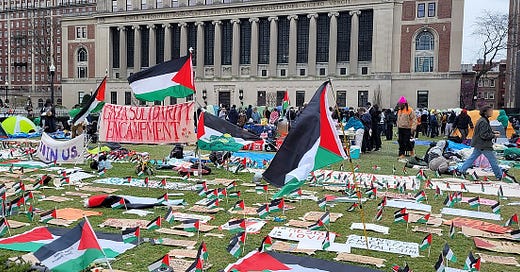OPINION | Media Narrative Has Begun to Shift on Campus Protests -- Finally
Hyperventilating over demonstrations not a good look for anti-war generation of the ’60s
Student protesters at Columbia University first wanted to occupy Low Library.
After an abortive effort to break through the locked doors of Low, the protesters regrouped, tearing down part of the fence surrounding a construction site. Several scuffles broke out with policemen, and one student was arrested.
Ultimately, they settled on Hamilton Hall, and by 2 pm, the occupation of Columbia University had begun.
Except that this scene is not from April 2024. Rather, it’s from an April day more than a half-century earlier, in 1968.
The point of this little exercise in time travel is to provide some important context: That when it comes to student campus protests, the nation’s been here before. Not only did the Republic survive, but actually was made better by the work of the protesters seeking the end of the Vietnam War, as well as racial segregation and American Apartheid.
So the narrative of pearl-clutching and breathless worry over the state of today’s campuses in the midst of sustained protests in support of the Palestinian people and against Israel’s brutal military operations in Gaza is as hypocritical as it is disheartening.
Hypocritical because the same people complaining and caterwauling about today’s protests in support of Palestinian freedom and in opposition to Israel’s brutal military campaign in Gaza, which has left dead nearly 35,000 Palestinians — including thousands of young children and women — are often from the same Baby Boomer generation that led those seminal campus demonstrations in the 1960s and early ’70s.
And disheartening because of the lopsided mainstream media narrative that has unfairly characterized these ongoing protests from the beginning.
As a former journalist myself, I regularly resist efforts to “blame the media.” I know that the media is no monolith, and I've worked side-by-side with enough other reporters to know that they’re generally a hard-working and conscientious lot just trying to do the best jobs they can.
In this case, however, the bent of the work published and broadcast to the American people is impossible to ignore.
Fortunately, this week — even as campus authorities began cracking down on the student protests — certain members of the media and others have begun waking up. And speaking out.
Sunny Hostin got it 100-perfect Monday on their popular ABC chat show, The View.
Hostin, explicitly, called for a fundamental shift in how we look at these protests.
“I think we need to shift the framing of these college protests, in my view,” she began. “I think college campuses have been the place for anti-war protests for as long as I can remember.
“I think recent protests haven't even reached the scale of the major student protests we saw in the late 1960s against the Vietnam War, or even in the 1980s against South Africa’s practice of Apartheid,” Hostin continued.
Hostin, rightly, puts her finger right on it when she complained that the press have not been properly describing these recent protests.
“And I think that it’s very distressing — distressing that we are framing these as ‘pro-Palestinian’ protests or ‘pro-Israel’ protests,” she said. “These are anti-war protests.
“ … The students are telling me, ‘This is a humanitarian crisis.’ What we also don’t talk enough about is the fact that 35,000 — mainly women and children — have been murdered,” she added. “What we also don’t talk about, I think, enough is that for some reason the discussion against Israel’s policies — which the UN has called ‘war crimes,’ which the International Criminal Court is investigating as war crimes — what we don’t say is, ‘These are people.’”
Hostin’s last declaration there could well have a double meaning. Yes, the Palestinians are people. And so are those student protesters standing up for them here at home.
It’s well past time that Americans — especially American journalists — start acting like it.
Please support our work…
Please subscribe…




